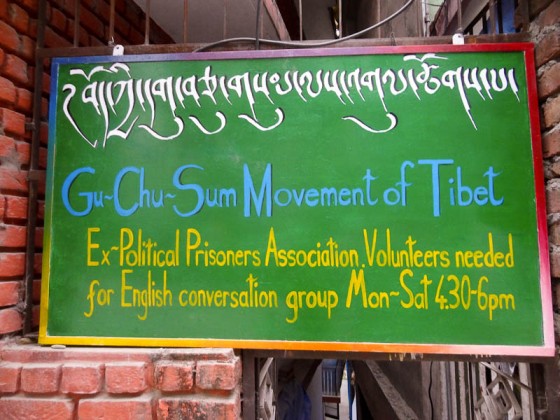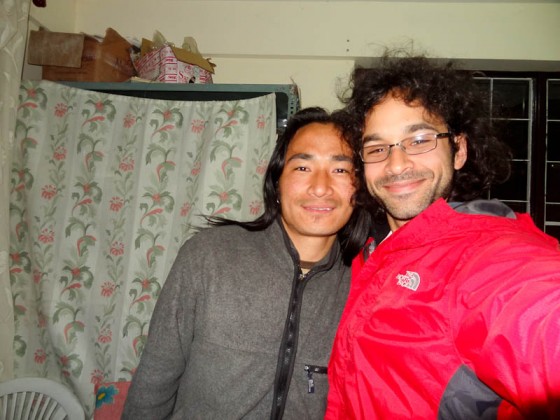Volunteering At An Ex-Tibetan Political Prisoner Camp
I was walking down the street on my first full day in Mcleaodganj/Dharamsala when I stumbled upon this sign. It would have been easy to miss, but I was in tune with my beautiful surroundings in this amazing place.
It was about noon, so I got something to eat and hung out in the cafe attached to this organization.
I was the first foreigner to show up and there was one Tibetan sitting inside. His name is Lobsang and we spoke for what seemed like 10 minutes but was actually 90 minutes. One other American came and spoke to two other Tibetans.
Lobsang is 29 and lives on-site at the Gu-Chu-Sum Movement of Tibet with about 70 other ex-political prisoners.
He is from the Amdo region of Tibet, the same region the Dalai Lama is from. He was a herder in Tibet, herding yaks, horses, and sheep. He only attended school for three years, but as a nomadic herder his education came from his parents.
Unfortunately, he was arrested twice as a young man. His dastardly crime: reading a book by the Dalai Lama. As part of the Chinese effort to erase Tibetan culture and religion, everything related to the Dalai Lama is outlawed in Tibet. For Tibetans, the Dalai Lama is their god. His picture is everywhere in Tibetan communities in exile the way pictures of kings and queens are hung in other parts of the world.
Both times he was beaten and jailed. Having lost six months of his young life to imprisonment, he decided to escape instead of living a life absent of freedom. He set off on foot to Nepal. Just a reminder, we’re talking about the Himalayas here. Walking across them is a life or death proposition.
Once he reached Nepal he was passed from Tibetan community to another until he got to India where he settled in Dharamsala.
He has lived in Dharamsala for the past eight years, going to school and adjusting to his new life with freedom but without family. Imagine having to choose between family and freedom. That’s what it came down to for him. As I write this in November 2012, this past U.S. election campaign was full of the use of the word freedom. I think such nonsensical slogans can only work when the population it’s used on truly has no idea what lack of freedom looks or feels like. I share Lobsang’s story to show the reality of what Tibetans face, and to put freedom in perspective. I also share it because his story is unfortunately not unique among the Tibetan community.
We had a nice conversation. I told him I thought Tibetan women were beautiful, which he found funny. He said the Tibetan women in Tibet are too muscular and strong due to the hard work they do, but the Tibetan women here are skinny and weak since they don’t have to do hard work. I guess he prefers something in the middle, which is hard to find here. It also shows that people are never satisfied 🙂
He plays the Dramyin, a traditional instrument. Once he completes his studies in June 2013 he hopes to join some friends in Goa, India, a tourist town where he can play music and earn money – his dream of combining his passion for music to earn a living.
In all seriousness, as I left it was hard to fight back some tears. Life can be so unfair. Some people look at me as an inspiration for following my dreams. I left a comfortable existence to follow my dreams, often living in far less comfort than I could otherwise have. Fine. I can see how that can inspire others with dreams to take their own plunge. But what about Lobsang? For me, people like him are the inspiration. Making the most of genuine unfairness and not complaining. Accepting what life has thrown them, making the most of it, and finding happiness despite the odds.
As I travel I end up having more questions than answers. This is a perfect example. But lucky the important stuff is felt. It bypasses the faulty human brain and goes straight to the heart and requires no thinking.
I say happiness is a decision. Lobsang decided to be happy, which meant leaving home, leaving his family, walking across the Himalayas, and attaining freedom. Every decision has consequences – even the decision to be happy.












What a wonderful story Adam! Thank you for sharing it. I think the power of your telling is in the clarity and simplicity, which it seems to me reflect Lobsang’s actions. I particularly like the last paragraph:
“I say happiness is a decision. Lobsang decided to be happy, which meant leaving home, leaving his family, walking across the Himalayas, and attaining freedom. Every decision has consequences – even the decision to be happy.”
Will you be volunteering in Dharamsala for an extended period?
Unfortunately I only spent a couple days in Dharamsala so no, not an extended period of time. But I’d love to go back. It’s a wonderful place.
inspirational article… nicely compiled
Thanks!
I was scheduled to board a train from London to York yesterday, a roughly 300miles journey, 2.25 hours by train, 4.5 by coach. On getting to the station I realized I had lost my ticket and had no cards on me. I spoke to the train conductor before the train departed, showing him my ticket receipt, and asking if I did have to buy a new ticket (quite expensive) – could He bill it to my home.
He’s reply largely constituted ‘No, it’ll add my work, get off my train’
Though I had a backup plan, In an instant it dawned on me how easy it is for people become stranded, with no option but simply to ‘walk’
Such a great story. And in your case it was your fault that caused you to have to “walk.” In so many others, the causes are beyond your control. Thanks for sharing and I hope you got to York!
Another great story Adam, showing the benefits of taking the leap and speaking to strangers.
I’d love to go to Dharamsala. I’ve been fascinated by Tibet’s history for all of my adult life and I feel I’d get a better understanding of Tibetan life and culture in Northern India rather than Tibet – a place I almost went to last week but decided not to in the end.
I hope you get a chance to visit. It’s truly a magical place!